Most of the time you may find it hard to concentrate, forget things, and misplace items. These issues are normal which can simply be resolved with proper diet. Just as your body needs fuel, your brain needs specific nutrients. Add the best brain food in your diet to sharpen your memory, focus and your overall mental performance.
Certain foods are rich in nutrients that support brain health. For instance, omega-3 fatty acids, found in fatty fish like salmon and sardines. These are important to maintain brain cell structure and function. Similarly, antioxidants present in berries and dark chocolate help combat oxidative stress, which can damage brain cells over time.
Moreover, nutrients like choline, found abundantly in eggs, produce acetylcholine, a neurotransmitter associated with memory and learning. Unfortunately, studies indicate that about 90% of people don’t consume enough choline daily, potentially impacting their cognitive abilities.
Here are 15 best brain foods that can enhance your memory and focus. From leafy greens packed with B vitamins to nuts rich in vitamin E, we’ll find how each food contributes to mental health. Whether you’re a student aiming to improve study habits, a professional seeking better concentration, or someone looking to maintain mental sharpness with age, add these foods into your diet.
1. Fatty Fish (Salmon, Trout, Sardines)

Fatty fish is the main brain food. If you often find yourself feeling mentally drained or forgetful, your brain might be craving more omega-3 fatty acids, specifically DHA and EPA.
About 60% of your brain is made of fat, and a big chunk of that is DHA. Your brain cells use it to build strong membranes and maintain communication between neural pathways. Simply put, without enough omega-3s, your brain can’t work efficiently.
A study in Neurology found that people with higher omega-3 levels had better cognitive function and larger brain volumes. DHA even supports brain-derived neurotrophic factor (BDNF), a protein that promotes the survival of existing neurons and encourages the growth of new ones.
How it helps you:
- Sharpens memory
- Enhances focus
- Reduces cognitive decline
- Helps prevent Alzheimer’s disease
These perfect for kids, for seniors, and everyone in between. Try grilled salmon for dinner or sardines on whole-grain toast, your brain will thank you.
2. Blueberries
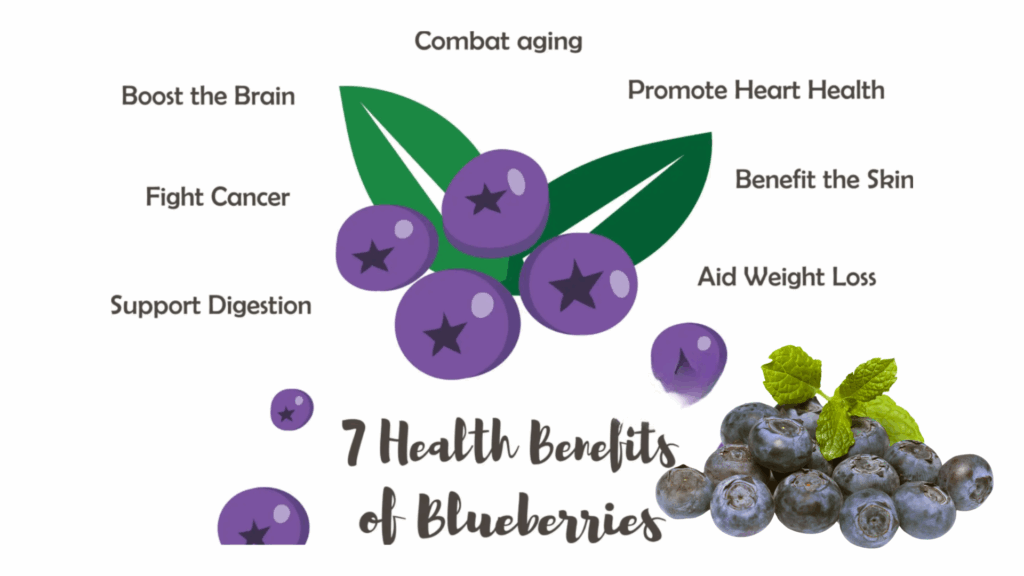
Blueberries are tiny but powerful brain food. If stress and fatigue have been clouding your thinking, this is one of the best brain snacks you can grab.
Blueberries are rich in anthocyanins, a type of antioxidant that helps protect your brain from free radicals. These unstable molecules damage brain cells and accelerate brain aging.
According to a Harvard study, eating blueberries at least once a week can delay brain aging by up to 2.5 years. Their antioxidants also help improve communication between brain cells, which enhances learning and memory.
How it helps you:
- Improves long-term memory
- Fights oxidative stress
- Boosts attention and mental performance
They’re also a tasty brain food snack, easy to toss into a smoothie or eat by the handful. Blueberries are ideal for kids, students, and even the elderly dealing with cognitive decline.
3. Broccoli
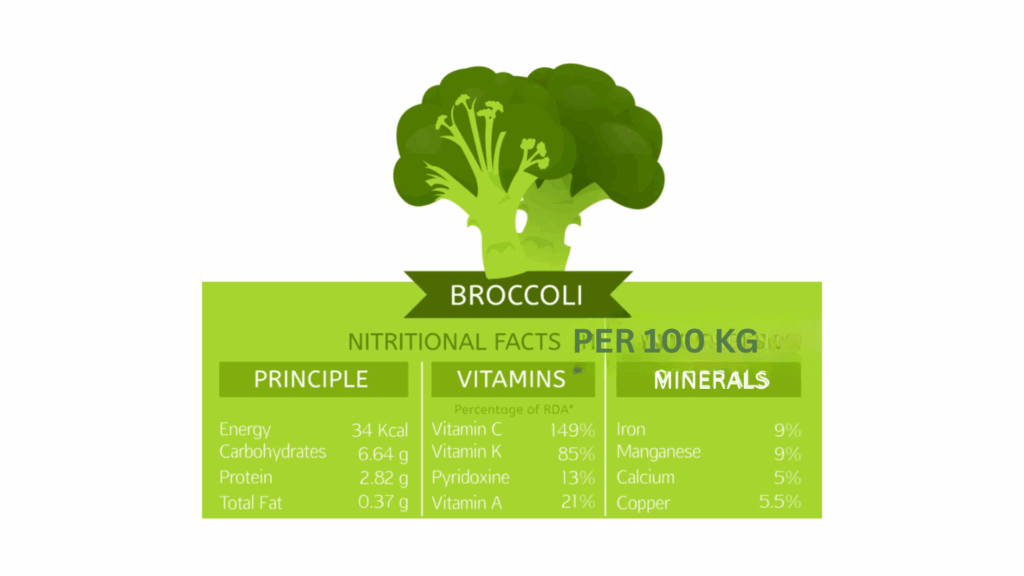
Yes, the green veggie that many avoid turns out to be one of the most effective brain foods around. Broccoli is rich in vitamin K which form sphingolipids. It’s a type of fat packed into brain cells. It also contains antioxidants and compounds like sulforaphane that have strong anti-inflammatory effects.
Vitamin K supports cognitive function and helps prevent neurodegenerative diseases. Sulforaphane, on the other hand, helps neutralize brain inflammation and supports brain cell regeneration.
How it helps you:
- Improves cognitive clarity
- Protects against brain inflammation
- Supports brain development in children
Whether steamed, roasted, or added to pasta, broccoli deserves a regular spot on your plate.
4. Pumpkin Seeds
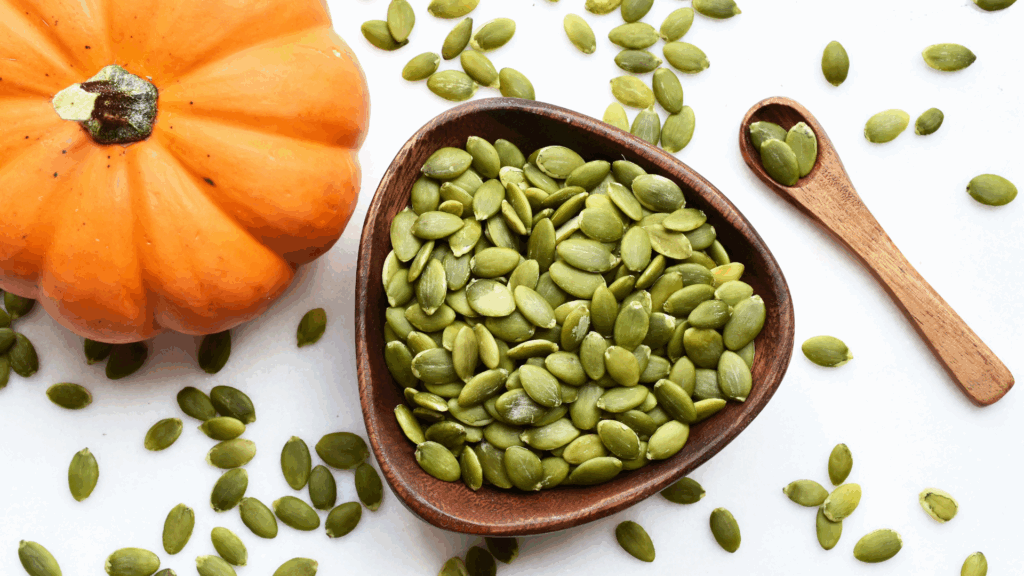
Pumpkin seeds are a nutrient powerhouse. These seeds are packed with magnesium, iron, zinc, and copper. All are essential for nerve signaling and keeping brain chemicals in balance.
- Magnesium: Supports learning and memory
- Zinc: Regulates nerve signaling and protects against neurodegenerative diseases
- Iron: Helps deliver oxygen to the brain
- Copper: Aids in neurotransmitter function
Low levels of these minerals have been linked to increased risk of brain fog, depression, and Alzheimer’s disease.
How it helps you:
- Enhances alertness
- Prevents cognitive decline
- Supports emotional and mental health
5. Dark Chocolate
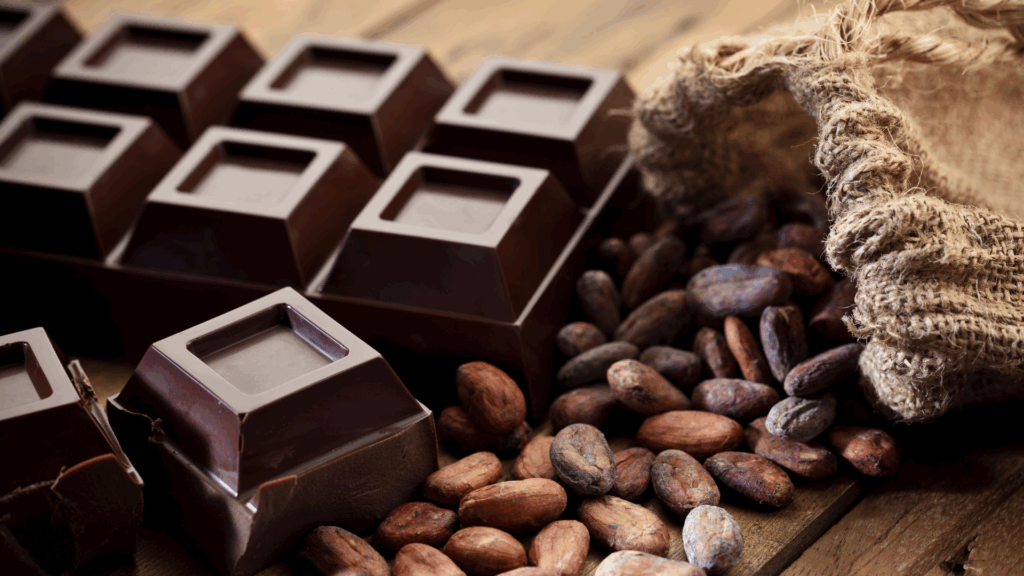
Dark chocolate (at least 70% cacao) is loaded with brain-boosting compounds. It’s rich in flavonoids, caffeine, and powerful antioxidants. Flavonoids specifically concentrate in the areas of the brain responsible for learning and memory, like the hippocampus.
Research published in Frontiers in Nutrition shows that flavonoids improve cognitive performance, decision-making, and even protect against age-related decline.
How it helps you:
- Improves focus and mood
- Enhances decision speed
- Helps fight mental fatigue
It’s one of the easiest brain food snacks to love. Just remember: moderation is key.
6. Nuts (Especially Walnuts and Almonds)
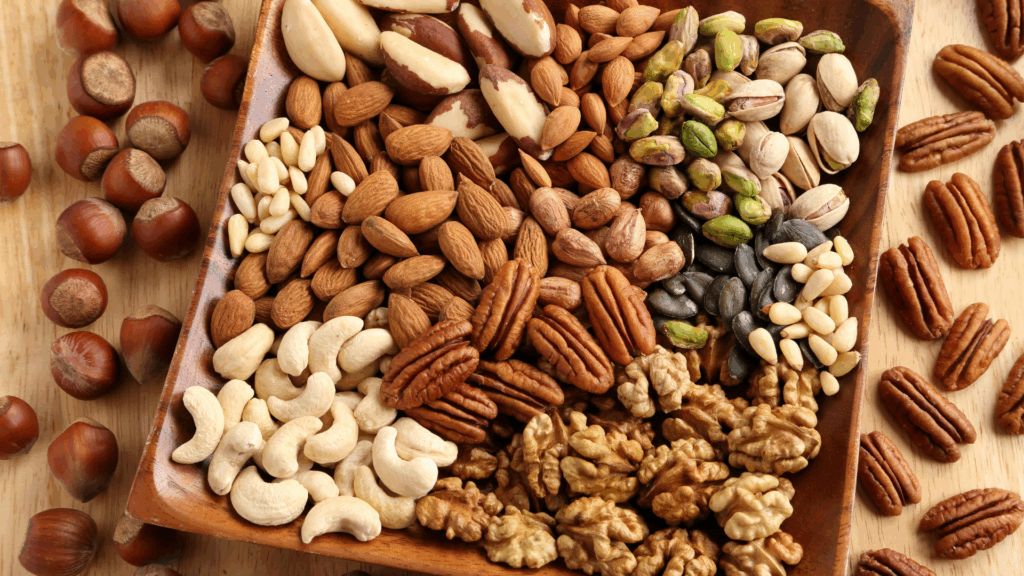
Nuts are a fantastic plant-based protein option and among the best brain foods you can eat regularly. They’re packed with vitamin E, healthy fats, and antioxidants.
Walnuts, in particular, are rich in ALA (alpha-linolenic acid), a plant-based omega-3 fatty acid linked to reduced brain inflammation.
A study found that higher nut consumption was associated with better cognitive test scores in older adults. Vitamin E also helps prevent cognitive decline by shielding cell membranes from oxidative stress.
How it helps you:
- Slows down brain aging
- Supports memory preservation
- Reduces risk of Alzheimer’s disease
Nuts are perfect as a snack or added to breakfast bowls for seniors and people with a family history of neurodegenerative diseases.
7. Oranges
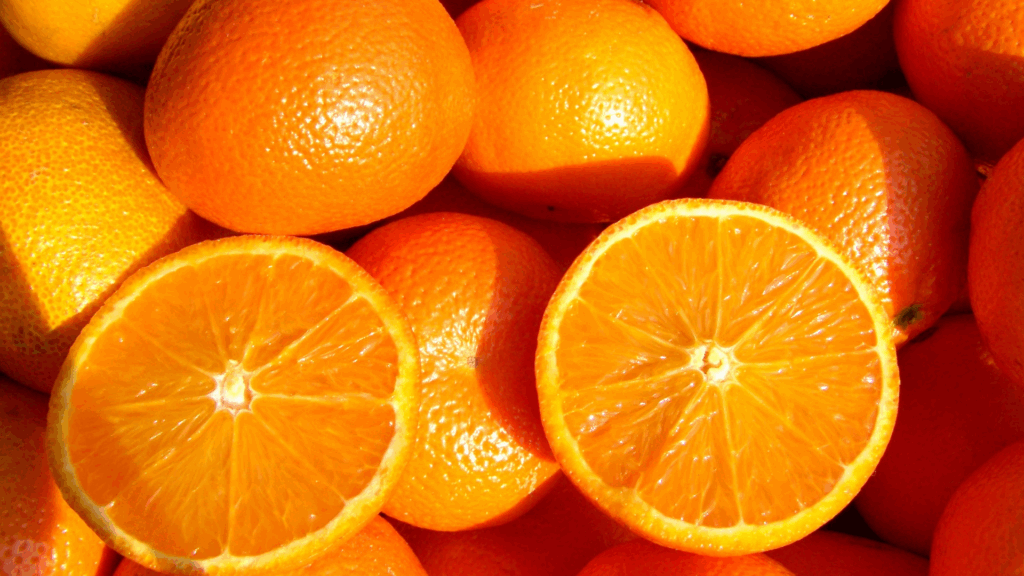
Just one medium-sized orange gives you all the vitamin C you need in a day and that’s big news for your brain.
Vitamin C is a strong antioxidant that neutralizes free radicals in the brain. It also plays a role in neurotransmitter production, supporting mood regulation and cognitive function.
Higher blood levels of vitamin C are linked with better performance on attention and memory tests. It also helps protect against mental decline associated with aging.
How it helps you:
- Sharpens concentration
- Protects against brain shrinkage
- Boosts neural functioning
8. Eggs
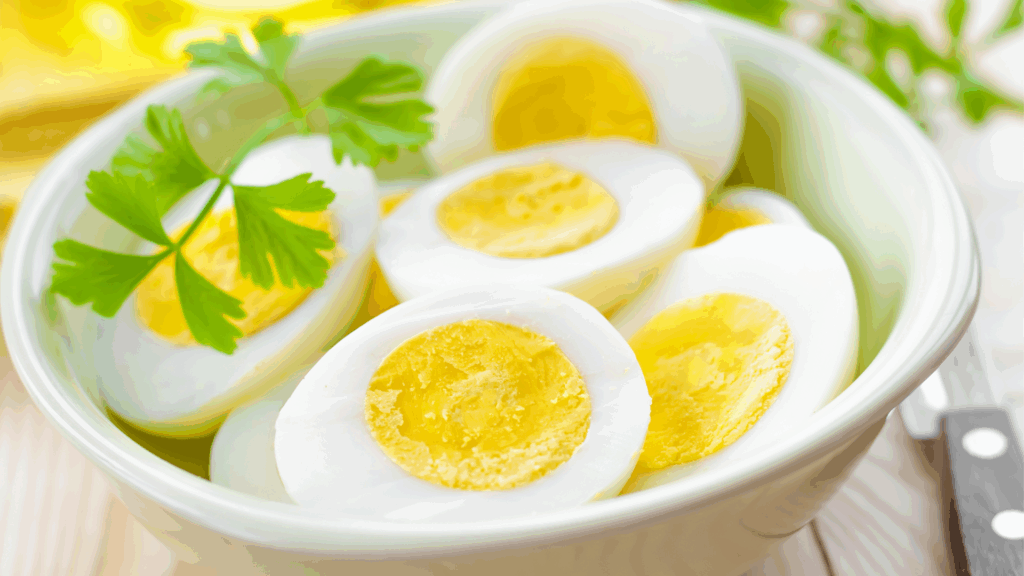
If you’re skipping eggs because of cholesterol concerns, it’s time to reframe them as a superfood for the brain especially for kids and students.
Eggs are one of the richest sources of choline, a nutrient your brain uses to produce acetylcholine. Acetylcholine is a neurotransmitter that helps regulate mood, memory, and mental performance. They also contain B vitamins like B6, B12, and folate — all critical for preventing brain shrinkage and cognitive decline.
A research study found that individuals with higher choline intake performed better on memory and language tests.
How it helps you:
- Boosts memory concentration
- Supports brain development in babies and toddlers
- Helps regulate mood
9. Green Tea
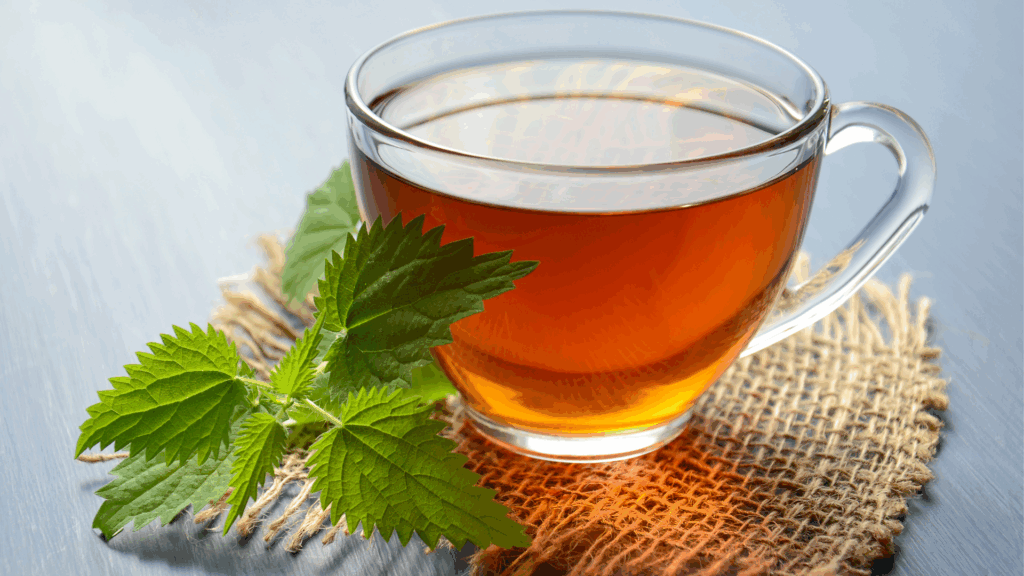
If you need sustained focus without the jitters of coffee, green tea is your best bet. Green tea contains a unique combination of caffeine and L-theanine.
Together, they improve attention, reaction time, and working memory.
This duo can enhance mental clarity and reduce mental fatigue, especially under stress. It’s also rich in polyphenols that protect the brain from oxidative stress.
How it helps you:
- Improves focus
- Enhances mental stimulation
- Calms anxiety while staying alert
Sip on it while studying or during a long work session. It’s one of the most underrated brain foods for studying.
10. Coffee
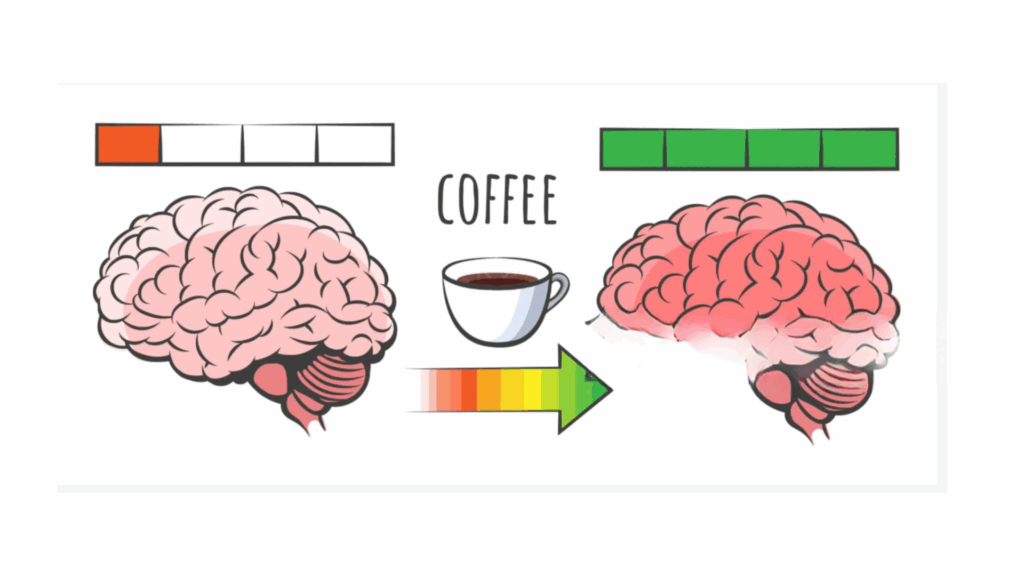
Your morning cup could actually be doing wonders for your brain. Coffee is loaded with caffeine, a stimulant that temporarily enhances alertness and focus. But it’s not just the caffeine. Coffee also contains antioxidants that protect brain cells and reduce the risk of cognitive decline.
Caffeine can increase cognitive function and reduce the likelihood of developing Alzheimer’s disease and Parkinson’s disease. Coffee also increases dopamine production, which helps with mood regulation and motivation.
How it helps you:
- Improves concentration and focus
- Boosts mood and combats brain fog
- May reduce the risk of neurodegenerative diseases
11. Turmeric
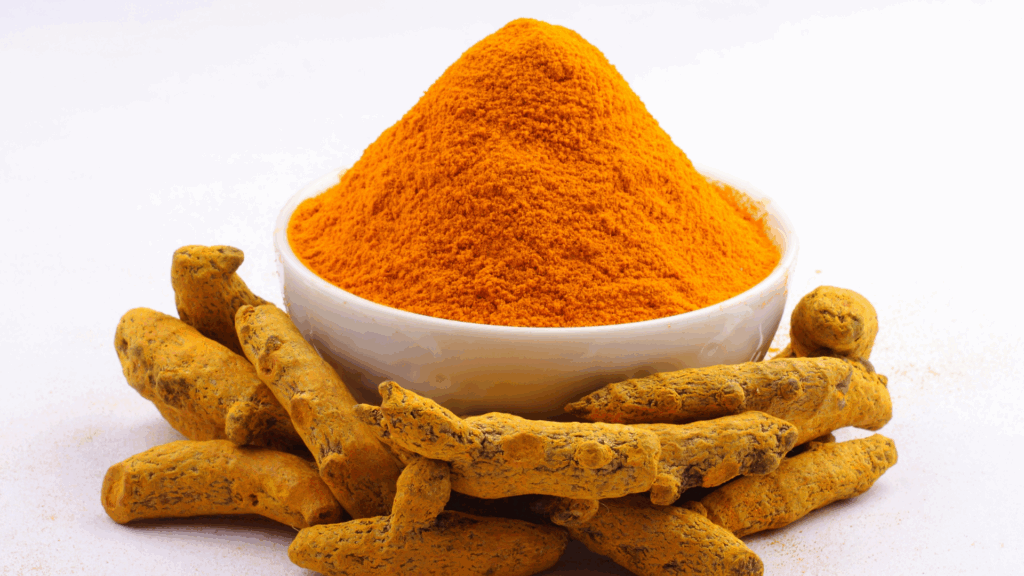
Turmeric might be one of the most powerful anti-inflammatory foods in your kitchen, and it’s a key player when it comes to brain health.
Curcumin, the active compound in turmeric, has been shown to cross the blood-brain barrier. This is critical because it can directly affect brain cells. It has strong anti-inflammatory and antioxidant properties that reduce brain inflammation and protect against oxidative stress.
Curcumin can help reduce the buildup of beta-amyloid plaques, which are associated with Alzheimer’s disease. It also boosts brain-derived neurotrophic factor (BDNF), a protein that promotes the growth of new brain cells.
How it helps you:
- Reduces brain inflammation
- Protects against brain aging
- Enhances memory and stimulates brain cell growth
Incorporate turmeric into your meals whether in curries, smoothies, or even as a latte. This is an easy way to support long-term brain health.
12. Leafy Greens (Spinach, Kale, Arugula)
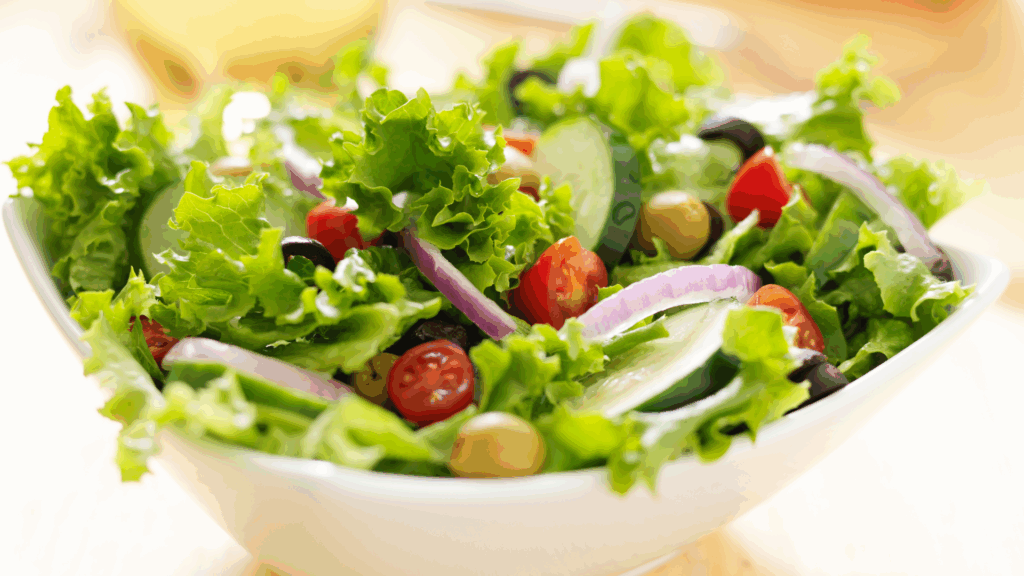
Leafy greens aren’t just great for your body. They’re incredibly nourishing for your brain too. These vegetables are rich in lutein, vitamin K, and beta carotene.
Vitamin K takes part in the production of sphingolipids. These molecules critical for maintaining cell membranes in the brain.
People who consumed more leafy greens had a slower rate of cognitive decline compared to those who ate fewer. These vegetables also contain high levels of antioxidants, which protect brain cells from damage caused by free radicals.
How it helps you:
- Supports cognitive function
- Protects against brain shrinkage
- Slows cognitive decline
A salad with kale, spinach, or arugula makes for a fantastic and easy way to boost your brain health.
13. Avocados
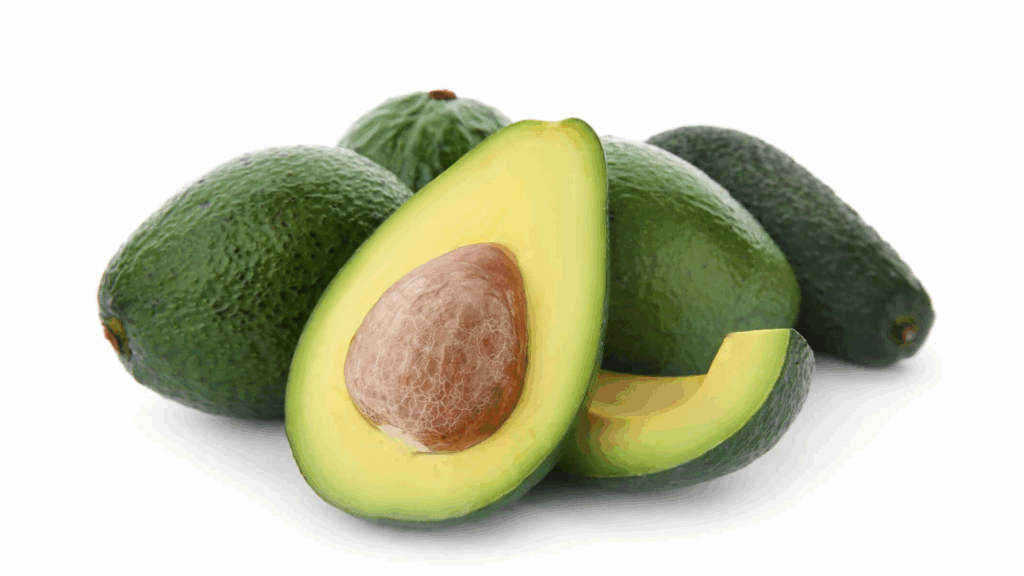
Avocados are not only creamy and delicious, but they’re also brain food powerhouses. They are packed with healthy unsaturated fats, particularly monounsaturated fats, which are vital for healthy blood flow to the brain.
Healthy blood flow means better oxygen and nutrients delivered to your brain cells, helping them function optimally.
Eating avocados can improve cognitive function and prevent the build-up of beta-amyloid plaques. It’s a major contributor to Alzheimer’s disease. They also support neurotransmitter balance, which is important for memory and mood regulation.
How it helps you:
- Promotes healthy blood flow to the brain
- Enhances memory and learning
- Reduces the risk of neurodegenerative diseases
Enjoy avocados in salads, smoothies, or simply with a sprinkle of salt and pepper for a quick snack.
14. Whole Grains
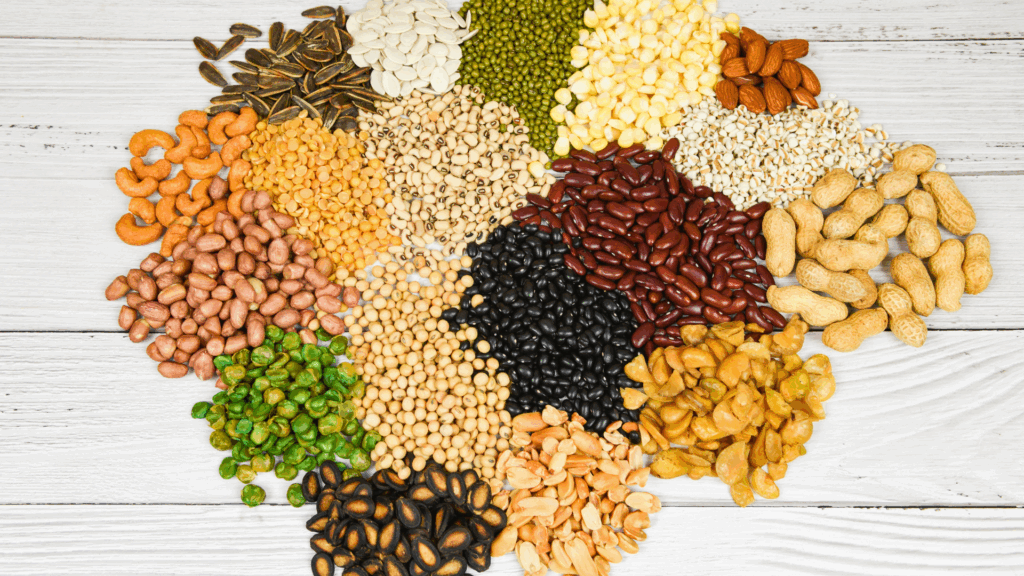
Whole grains are rich in complex carbohydrates, which provide a slow and steady release of glucose, the brain’s primary energy source. They also contain fiber and B vitamins, including B6 and B12, which support cognitive function and help maintain a healthy nervous system.
The B vitamins in whole grains also help reduce homocysteine levels — a marker for Alzheimer’s disease.
How it helps you:
- Provides steady energy for the brain
- Supports memory and concentration
- Helps prevent cognitive decline
Opt for whole grains like oats, quinoa, and brown rice to keep your brain fueled throughout the day.
15. Beans
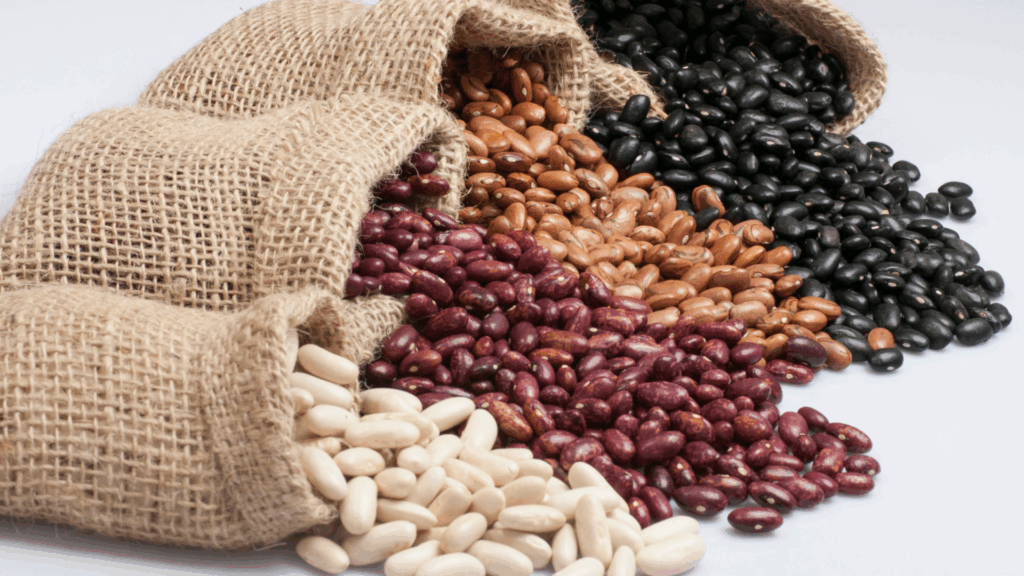
Beans are packed with complex carbohydrates, fiber, and plant-based protein. This powerful trio stabilizes blood sugar levels, providing your brain with a consistent supply of glucose. Its main source of energy. No spikes, no crashes, just balanced energy to help you think clearly.
But that’s not all. Beans are also rich in folate, magnesium, iron, and antioxidants. All crucial for maintaining brain health and preventing cognitive decline.
Diets rich in legumes (like beans) are associated with better cognitive performance and reduced risk of Alzheimer’s disease. The folate in beans helps regulate homocysteine — high levels of which are linked to brain atrophy and memory loss.
Beans also help improve the gut-brain connection. The fiber in beans feeds good gut bacteria, which in turn supports the production of mood-boosting chemicals like GABA and serotonin.
How it helps you:
- Provides steady energy for brain
- Supports memory, focus, and overall cognitive function
- Helps prevent mental decline and supports gut-brain health
- Great plant-based option for vegetarians and vegans
Whether you go for black beans, chickpeas, lentils, or kidney beans, adding them to soups, salads, or wraps is a simple way to level up your brain power.
Frequently Asked Questions About Best Brain Foods
What are the best brain foods for students?
If you’re a student, a professional prepping for a test you need brain food snacks that support concentration, focus, and memory. Eat dark chocolate, barries, walnuts to sharpen your memory. They provide steady energy and improve mental clarity without that heavy feeling.
What is the best brain foods for children and toddlers?
Several foods improve learning and behavioral health in children. This food includes eggs, fatty fish like Salmon, leafy greens like spinach or kale etc. These are truly the best brain foods for kids and toddlers, helping fuel smarter thinking and healthy growth.
Which food is good for memory?
If I had to pick one, fatty fish like salmon or sardines top the list. They’re loaded with DHA, a type of omega-3 fatty acid that makes up a large portion of your brain. Your brain cells literally depend on it to function properly. But don’t stop there. Blueberries and walnuts help fight age-related decline.
How do I boost my brain memory?
Start by feeding your brain the right fuel. Eat more brain foods like leafy greens, eggs (for choline), avocados, and pumpkin seeds. These foods support neurotransmitter production and keep your brain cells healthy. Get plenty of sleep, move your body daily, and hydrate well.
Which drink is best for brain memory?
Green tea is calm and powerful at once. The L-theanine it contains helps increase alpha brain waves, keeping you alert but relaxed.
Blueberry smoothies are another great choice. Blend them with spinach and a bit of flaxseed, and you’ve got a drink packed with flavonoids, vitamin K, and omega-3s.
Avoid sugary sodas and energy drinks. They spike blood sugar and hurt your brain in the long run.
Final Thoughts
If you’ve made it this far, I hope you’re feeling inspired because taking care of your brain doesn’t have to be complicated. Just real, whole foods that nourish your brain from the inside out.
Start small. Maybe add a boiled egg to breakfast, toss some blueberries into your yogurt, or swap white rice for quinoa. Every small choice adds up. And the best part? These foods not only sharpen your memory and focus. They also support your mood, energy, and overall health.
Remember, your brain is always working for you. Keep it balanced. Stay hydrated. Move your body. And don’t forget to enjoy the process. Eating for brain health isn’t just smart, it’s delicious.
Your mind matters. Fuel it wisely.

Pingback: What are the 7 Habits to Avoid Dementia? - Heal With Aneesa
Pingback: Top 10 healthiest fast food options that won’t ruin your diet - Heal With Aneesa